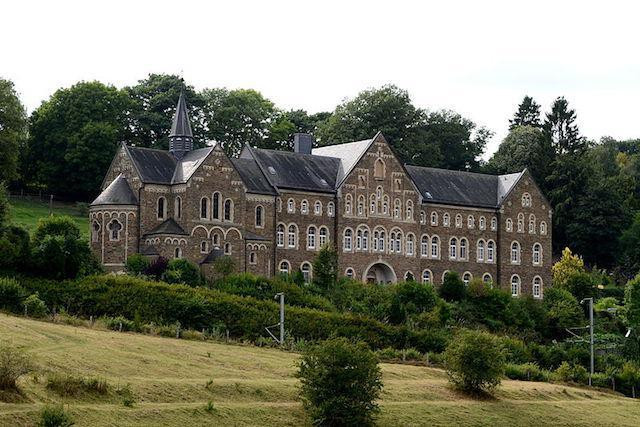Prime minister Xavier Bettel (DP), speaking at the Wednesday press conference following the signing, said the agreement was a way to “recognise the mistakes of an administration to a specific community, and this merits not only reparation but also apologies.”
As part of the agreement, the Luxembourg state has agreed to acquire, renovate and cover operating costs of a commemorative learning centre at the Cinqfontaines Abbey, which was used as a deportation site during WWII.
As Delano reported on Wednesday morning, the Luxembourg Foundation for the Remembrance of the Shoah will also have a more central role, including the decision making for the commemorative centre.
The Foundation will further receive €120,000 per annum over 30 years to promote its objectives which include, among other aspects, the fight against Holocaust denial and racism; support for Jewish historical heritage sites with a World War II link, including cemeteries; support for survivors with grand duchy ties; as well as two new members, one appointed by the Luxembourg prime minister, the other by the Consistory per proposal by the World Jewish Restitution Organization (WJRO), the mission of which is to work for such restitution and compensation on an international level, together with local Jewish communities.
The Foundation’s president, François Moyse, praised Bettel’s efforts of “work[ing] for the memory like no other decision maker since the war.” Such recent efforts of the government have included the creation of working groups, the creation of the Foundation in 2018, as well as the inauguration the same year of the “Kaddish” monument to the Shoah, the first of its kind for Luxembourg, sculpted by French-Israeli artist Shelomo Selinger. As Bettel added: “We did it in a place that we knew was important, because we also wanted to confront the people passing by--to confront reality, to raise questions.”
Dormant accounts & more: a work in progress
Bettel said he has been asked why the agreement is only happening now, with Luxembourg being the last western country to formally sign such an agreement. “It’s never too late, but I must admit that in this matter it will never have been too soon. The time has come.”
At the start of the press conference the PM gave a nod to former US ambassador Randy Evans, who left his role just last week and who the PM acknowledged had wanted to be in the grand duchy for the signing.
In a statement issued the same day, US embassy chargé d’affaires Casey Mace referred to the agreement’s origins dating to “2009, when the US, Luxembourg and 45 other countries committed to rectify the consequences of the Nazi-era wrongful asset seizures and to promote the welfare of Holocaust survivors around the world by endorsing the Terezin Declaration.” He added that the embassy had “provided strong support to Luxembourg’s working group over the last two years to find agreement.”
For Bettel, the agreement “was a logical continuation” of work the government had started, which involved the “Jewish community representatives, representatives of resistance fighters, and forced conscripts.”
He added that although the agreement was “an important first step… the swift implementation of [it] will ensure that Luxembourg and its Jewish community can together achieve their common goals to maintain an open, tolerant society, but which we have to maintain to preserve.”
But there’s still plenty of work to be done.
There will be separate working groups to deal with the issue of dormant bank accounts with research covering the 1930-45 timeframe. “The banks concerned will soon be contacted in this context by the CSSF,” Bettel explained. “The banks concerned are those which already existed at the time or which have taken over the activities of such banks, and the funds will be transmitted either to the registered heirs, or to the Foundation for the Remembrance of the Shoah.” The PM also thanked finance minister Pierre Gramegna (DP) for his cooperation in this regard.
Other working groups will deal with unpaid insurance issues--with similar procedures as the dormant accounts-- as well as the restitution of property, works of art and other cultural property.
As outlined in the agreement, the Luxembourg state has agreed to pay a €1m lump sum to “Luxembourg survivors currently living abroad and the survivors who were in the grand duchy of Luxembourg at the time of the Shoah.” In charge of the distribution is the Conference on Jewish Material Claims Against Germany, sister organisation of the WJRO, the latter having a mission to work for the restitution and compensation of Holocaust survivors on an international level, together with local Jewish communities.
The Committee for the Remembrance of the Second World War has also been given an increased budget--€65,000 per annum over 10 years--while an additional €2m will be earmarked for research, e.g., through the university, national archives, etc.
